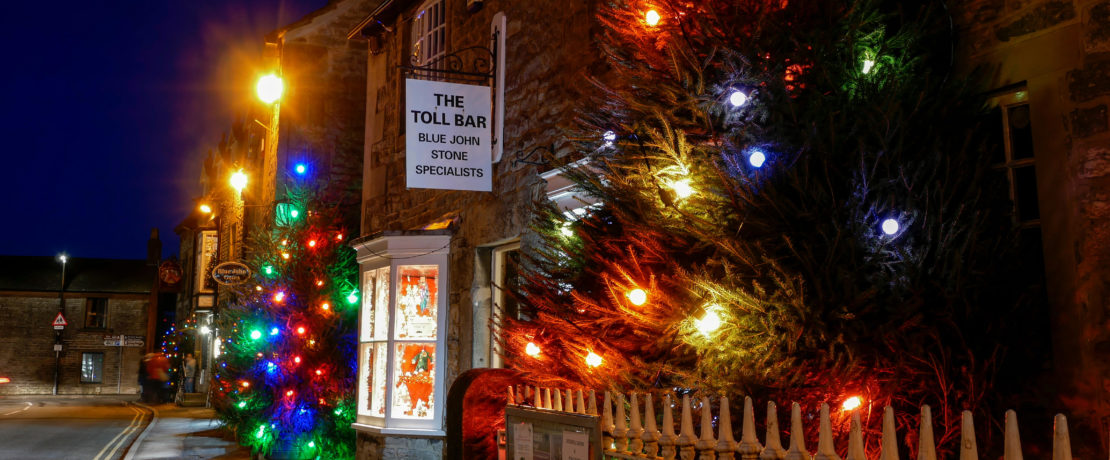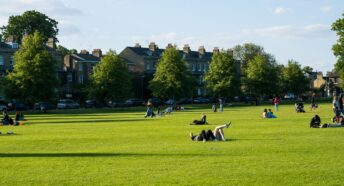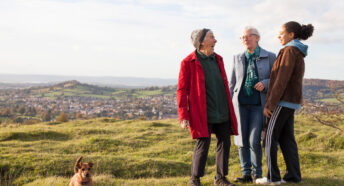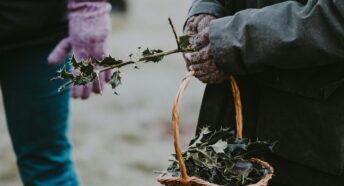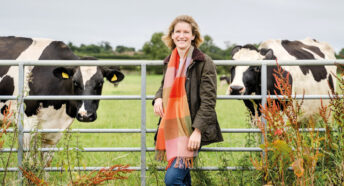The season to be jolly: rural festivities to lift your spirits
As Christmas draws ever closer, Caroline Donald interviews some of the rural communities coming together to banish the winter gloom with festive celebrations both traditional and modern.
Even for those with plenty of company, winter can be hard in rural areas – with long nights, cold and damp weather, and mud, mud, mud. Plus, having just emerged from two years of covid lockdowns, the high cost of living has dealt us another whammy this winter. All over the country, however, there are communities celebrating the fact that, after an enforced hiatus, we can come together during the festive season to bring light into these dark days.
Harbour lights
In some places, this is literal: for example, festoons of multicoloured Christmas lights have been cheering the pretty little harbour at Mousehole in Cornwall from December to early January for the past 50 years; or in Slaithwaite, West Yorkshire, where they regularly banish the winter blues for a week in February by coming together to make willow paper lanterns and parading down to the local canal in order to ‘rake the moon’ (the reflection of a large lantern) from the chilly waters.

In cider-making areas, marking midwinter can be a noisier business: wassailing is about waking the tree spirits with the clattering of pots, pans and general merriment, in the pursuit of a good apple crop for the upcoming year. Or for some rural communities, it could just be by the loud and lusty singing of carols, or the simple pleasure of being in a warm room with good company for a shared Christmas lunch.
Pride of the peaks
The village of Castleton, in Derbyshire’s Peak District National Park, prides itself on its enthusiastic display of Christmas trees and lights, which have been decking Cross Street – its main thoroughfare – since the 1960s, and now often attracts hundreds of visitors. The seasonal celebrations usually kick off in mid-November, with the primary school fayre and Santa leading a parade through the village to his grotto, his sleigh drawn by a tractor.
‘It used to be a horse!’ says local resident Vicky Turner, treasurer of Castleton at Christmas, which coordinates the various seasonal celebrations. They even managed to put on a display to lift spirits during the second pandemic lockdown (minus the usual switch-on ceremony), when the area was put into Tier 4 restrictions.
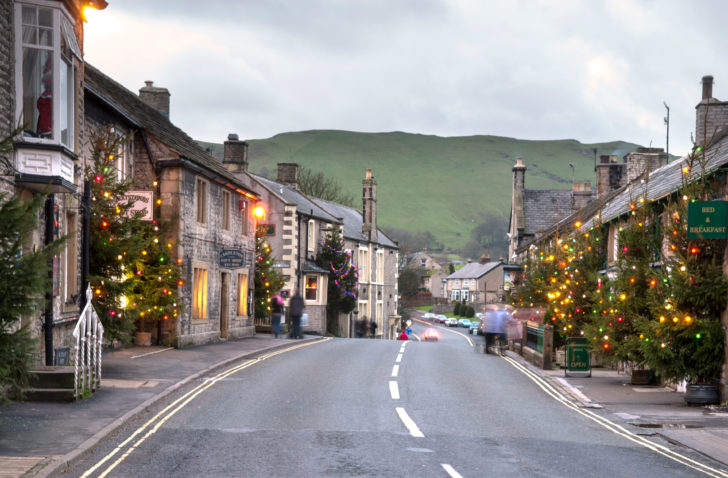
In the centre of the village, St Edmund’s Church is participating in another widespread festive tradition by holding a Christmas tree festival, with trees decorated by local organisations and businesses, and money raised by donations going to the fabric fund of the Grade I listed church. ‘The trees can be real or artificial, and there are some really ingenious ones: one of the outdoor centres does a tree decorated with ropes and climbing bits and bobs,’ says Vicky, who owns Treak Cliff Cavern, a mile outside the village. Her own display at the church is dotted with the rare blue john stone found locally.
Over at the cavern, fairy lights line the underground walls and, during weekends in December, they hold candlelit carols for up to 100 people. The nearby Peak Cavern, which can hold 500, goes one better, with carols accompanied by local silver and brass bands. ‘It is all very festive,’ says Vicky – and despite the energy crisis, the show will go on this year around Castleton: ‘Most people have LED lights, anyway.’
The celebrations are, as Vicky notes, ‘a real community affair for the whole two-month festive period, with different village organisations all involved in the preparations and events’. And, after costs are covered, all money goes to local charities.
Embracing rural tradition
Many rural communities still celebrate midwinter customs that honour the traditional connections between people, the seasons and the local landscape – and, in some cases, may even pre-date Christmas itself! Waking up orchards from their wintry slumbers by wassailing is one such tradition, which dates back to pagan times. Although the ceremony is now often held on Twelfth Night, the community of Whimple in Devon holds its celebration a little later – on 17 January – as it keeps to the pre-Gregorian calendar.
The event was first mentioned by a Victorian folklorist, and recorded events date back to 1931; today’s ceremonies were reinstated by the Whimple History Society in 1993. Encouraging a good harvest is serious stuff here, as cider-making has long been a vital part of the local economy, and the area once boasted the largest number of orchards in the world. It was the home of Whiteways Cyder, which closed in 1989. Although the factory site was sold off for development, ‘most of the orchards were retained, and cider-making is still very popular in the village’, says Louise Walmsley, who is the curator of the Whimple Heritage Centre.
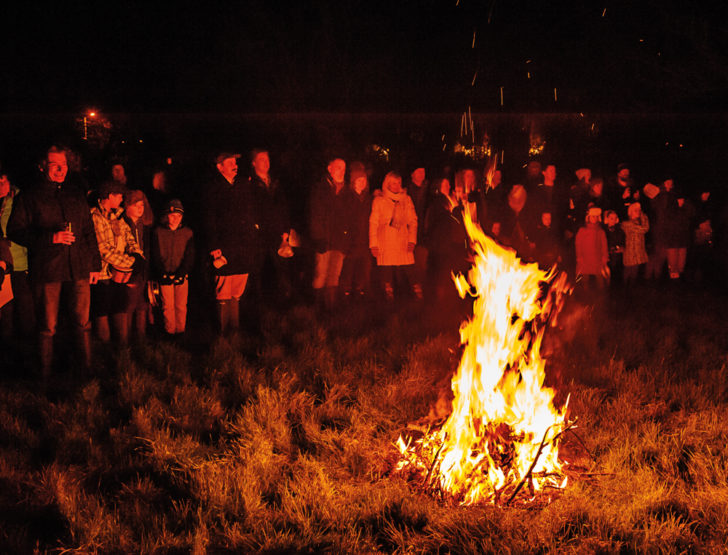
So what does the Whimple wassail entail? ‘We gather and process through the village in traditional costume, visiting the orchards,’ explains Louise. ‘A wassail prince and princess are chosen from the village primary school; the princess carries a piece of toast that has been dipped in cider (why, nobody knows!), and she is lifted up, so that she can put it into one of the apple trees.’
People are handed a glass of mulled cider, and then join in the local version of the Wassail Song. There’s little chance that these orchards will stay asleep for long: local musicians play, farmers fire a round of blanks, and villagers bring saucepan lids to clatter. Everyone then repairs to the cricket club, where soup, pasties and apple cake are served to about 150 locals.
‘It’s not a commercial thing,’ notes Louise. ‘It is very much liked by the community, which is why when we got to covid in 2021 and 2022, and we couldn’t do it, we asked everybody to have their own wassail in their garden. We don’t want to lose our apples!’
Local resident Rob Davis’s daughter Rosie, now aged 12, has been both a wassail princess and a queen. ‘For me, the wassails were magical; in particular, when we entered the orchards and were greeted with the sights of firepits and lanterns,’ Rob says. ‘The event enabled the whole village to get together across all generations.’
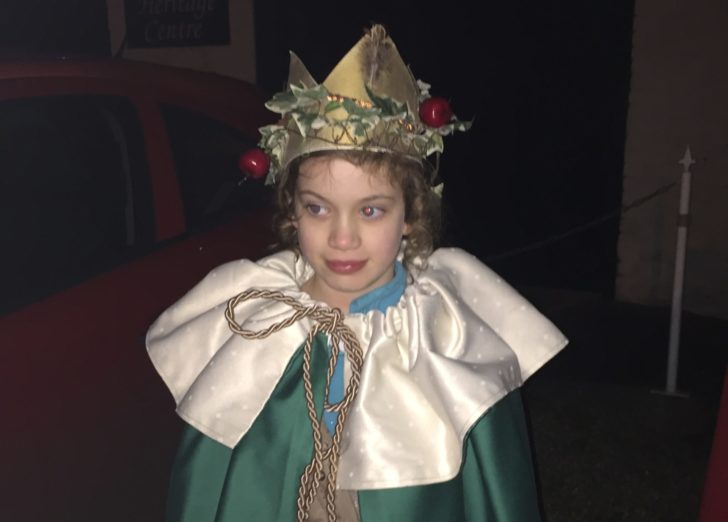
Rosie loved the chance to dress up: ‘It felt amazing – I loved throwing toast at the trees and singing the wassail songs. We learnt a special poem at school, which I had to shout at the top of my voice!’
Both father and daughter cherish their wassailing experiences, says Rob: ‘Whimple is very lucky to have this tradition, and we both felt like we were a part of something special.’
Community Christmas lunches
Across the country, many community groups, local businesses and individuals organise free or subsidised Christmas lunches or dinners. These gatherings are ideal for those in the area who might otherwise spend the festive season alone, such as the socially excluded, homeless or elderly. So popular have these become that the charity Re-engage, which supports older people, provides a Community Christmas directory, where people can list their own local events. Typically welcoming people of all faiths, or none, these festive meals can provide much-needed cheer for those feeling isolated at this time of year.
For some communities, such celebrations can be the highlight of a programme of social inclusion events, as in Merriott, Somerset. Held in the village hall, last year’s community Christmas lunch required a certain amount of logistical endeavour, as there was only one oven, and 40 people to feed. But where there’s a will there’s a way – and half of the meal was prepared at ARK at Egwood, the nearby 12-acre day centre that runs the lunches. ‘We cooked and sliced the turkeys beforehand, but did the rest at the hall – roast potatoes, sprouts, carrots, peas etc – and then had Christmas pudding or trifle for dessert,’ says Nigel Bell, CEO of ARK (which stands for Acts of Random Kindness).
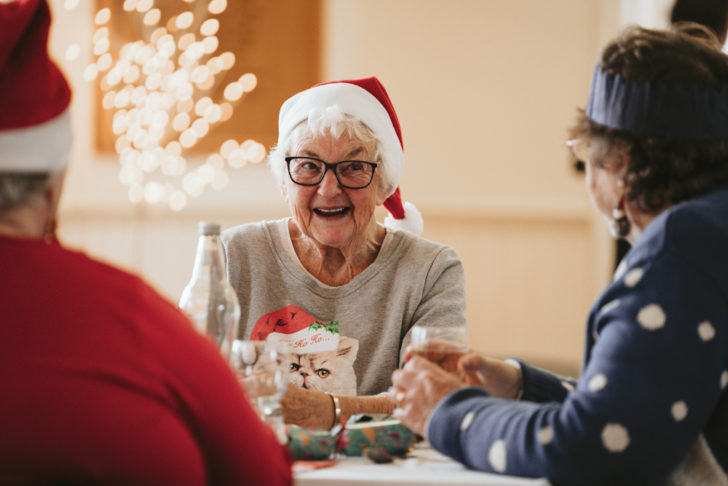
The Christmas meal was part of ARK’s fortnightly social inclusion lunch club, set up just over a year ago. Guests enjoy a subsidised two-course meal that includes ingredients grown at ARK; the local Co-op supermarket covers the rent of the hall; and Comic Relief provided a grant that allowed organisers to buy extra pots, pans and containers. To add to the fun of last year’s festivities, a Comic Relief team came along to cover the lunch and eat with everyone else, eight ARK volunteers included. Christmas jumpers were worn; songs were sung; chutneys and jams made at ARK were sold, and a jolly time was had by all.
And it’s not just the lunch guests who benefit. ARK is a day centre for those with learning difficulties, mental health issues or who lack social confidence, where people can muck in with growing produce, looking after the animals and helping out. Volunteering at the lunch club is a great way to boost one’s confidence, says Nigel, as well as learning the ‘soft skills’ of working in a team, cooking and serving food, and doing something for other people.
Eating with others
The lunch clubs have been a great success throughout the year. Jan, who is in her 70s, and her friend, Barbara, go along together: ‘Barbara and I both lost our husbands, so it gives us a chance to get out of the house, meet people and make friends. The quality of the food is amazing and I have tried things I have never had before. As I’m on my own, I can’t be bothered to cook some days, so eating with others is lovely.’
June, also in her 70s, is another regular: ‘They are so much fun, with lovely food and very friendly people, I would miss them if they weren’t here, especially as I live on my own. Every time I come, I go home feeling like I have been to a party.’
Winter blues: consider yourself well and truly banished!
About the author
Caroline Donald is a Somerset-based author and journalist who has contributed to the Daily and Sunday Telegraph, The Sunday Times, Country Life and House & Garden.
A version of this article was originally published in CPRE’s award-winning magazine, Countryside Voices. You’ll have Countryside Voices sent to your door three times a year, as well as access to other benefits including discounts on attraction visits and countryside kit from major high street stores when you join as a CPRE member. Join us now.
